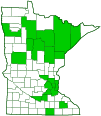band-winged crane fly
(Epiphragma fasciapenne)
Conservation • Description • Habitat • Ecology • Distribution • Taxonomy
Conservation Status |
|
|||||||
| IUCN Red List | not listed |
|||||||
| NatureServe | not listed |
|||||||
| Minnesota | not listed |
|||||||
Description |
||
Band-winged crane fly is a common, easily identified, moderate-sized crane fly. It occurs in the eastern United States and adjacent Canadian provinces east of the Great Plains. It is common in the northeast and upper Midwest. It is uncommon in eastern Minnesota, where it is at the western extent of its range. It is found in floodplain woodlands and wooded areas adjacent to swamps. Adults are ⅜″ to ½″ in length. The head is dark brown. The snout is short and has a beak-like point. The lower jaws (maxillae) have sensory structures (palpi) attached. The last (apical) segment of each palp is antenna-like and very long, much longer than the subapical segment. There are two large compound eyes and no simple eyes (ocelli). The antennae have 14 segments. They are light brown except for a dark base and pedicel, yellow first and second segments (flagellomeres), and yellow to light brown third and fourth flagellomeres. The upper thoracic plate (mesonotum) is brown with a darker reddish-brown margin. There is a distinct, v-shaped groove (suture) on top near the wing bases. The abdomen is long and slim. Each segment is yellowish-brown with darker brown markings including an upper (middorsal) longitudinal stripe, and one or more small spots on either side of the stripe. The legs are brownish-yellow and stilt-like, very long and very slender. They are fragile, easily separated from the body. The third segment (femur) has a darker brown band at the tip (apex). There is sometimes another darker brown band in the middle of the femur. The wings are very long and very narrow. They have four horizontal bands of brown spots separated by three clear bands. The spots are dark, well defined, and outlined with even darker brown. Several spots have hollow centers. The clear band in the middle of the wing is nearly always complete. The other clear bands are often interrupted. There is also a row of smaller spots at the margin of the wing tip. The spots may be distinctly separated or merge with adjacent spots. Each wing has two anal veins that meet the inner margin. |
||
Size |
||
|
||
Similar Species |
||
Habitat |
||
Floodplain and bottomland woodlands, wooded areas adjacent to swamps |
||
Ecology |
||
Season |
||
Late April to late July |
||
Behavior |
||
Adults rest with wings held out at right angles. |
||
Life Cycle |
||
|
||
Larva Food |
||
|
||
Adult Food |
||
|
||
Distribution |
||||
|
Sources |
|||
| 10/20/2022 | ||||
Occurrence |
||||
Common in the northeast and upper Midwest. Uncommon in eastern Minnesota, where it is at the western extent of its range. |
||||
Taxonomy |
|||
Order |
Diptera (Flies) | ||
Suborder |
Nematocera | ||
Infraorder |
Tipulomorpha (Crane Flies) | ||
Superfamily |
Tipuloidea (Typical Crane Flies) | ||
Family |
Limoniidae (limoniid crane flies) | ||
Subfamily |
Limnophilinae | ||
Tribe |
Hexatomini | ||
Genus |
Epiphragma | ||
Subgenus |
Epiphragma | ||
The genus Epiphragma was formerly placed in the subfamily Limoniinae under the family Tipulidae. |
|||
Synonyms |
|||
Limnobia fasciapennis Limnophila pavonina |
|||
Common Names |
|||
| band-winged crane fly | |||
Glossary
Femur
On insects and arachnids, the third, largest, most robust segment of the leg, coming immediately before the tibia. On humans, the thigh bone.
Flagellomere
A segment of the whip-like third section of an insect antenna (flagellum).
Mesonotum
The principal exoskeletal plate on the upper (dorsal) part of the middle segment of the thorax of an insect.
Ocellus
Simple eye; an eye with a single lens. Plural: ocelli.
Visitor Photos |
|||||
Share your photo of this insect. |
|||||
| This button not working for you? Simply email us at info@MinnesotaSeasons.com. Attach one or more photos and, if you like, a caption. |
|||||
Alfredo Colon |
|||||
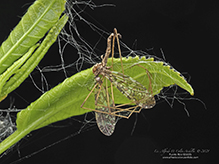 |
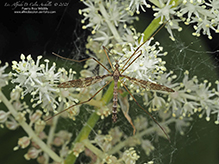 |
||||
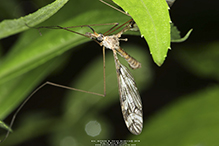 |
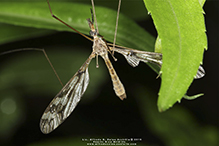 |
||||
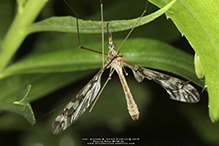 |
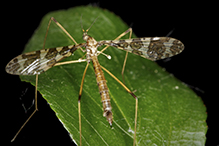 |
||||
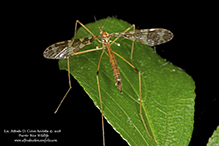 |
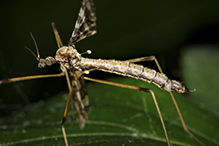 |
||||
MinnesotaSeasons.com Photos |
|||||
|
|||||

Slideshows |
||

Visitor Videos |
|||
Share your video of this insect. |
|||
| This button not working for you? Simply email us at info@MinnesotaSeasons.com. Attach a video, a YouTube link, or a cloud storage link. |
|||
Other Videos |
|||


Created 11/6/2018
Last Updated:
